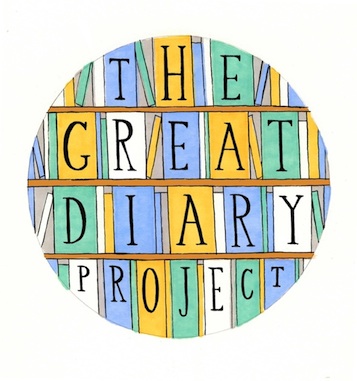Just as Kate Summerscale and I were putting our coats on and
getting ready to leave, she looked suddenly moved: ‘I like the idea of these
diaries being ‘unwanted’, it makes them sound like orphans’. The comparison of
diaries to helpless infants is also suggested in Summerscale’s new book, Mrs Robinson’s Disgrace, the true story
of a high-profile Victorian divorce trial where the main evidence and witness used
by the prosecution was a stolen diary. Like the heroines of romantic Gothic
novels of the time, Isabella Robinson used her diary as a means of confiding
the details of her melodramatic love life and adultery with a married man. Summerscale
reveals the sanctity of the diary; the idea of destroying such an intimate
object: ‘would feel something like dropping a child into this wild and
wandering grave’.
The scene that originally drew Summerscale to this story was
the moment in which Isabella’s diary was seized by her husband, as she lay in
bed delirious with fever, tossing and turning, muttering the names of other men.
Prowling around this flickering candlelit sickly room, Henry Robinson’s suspicions
were roused and he began rummaging through her writing desk, where he
discovered the diary. Summerscale’s imagination was ignited by this image of
the book being ‘lifted’ from the desk, like an infant from its cot, a living
creature untapped of its stories and secrets.
The diary was ‘beguiling’ to Summerscale as a source that
hovers on the ‘edge of fact and fiction…distorting and engaging… a reflection
of social confusion’. Summerscale’s own work treads this fine line between
reality and fantasy, as she strives for objectivity while imaginatively
stalking the past in vivid detail: ‘fiction seems a waste – there’s a frisson
about something being true’.
There is a masterful omniscience about this biography, which
at times feels like having an aerial view over the places and characters described.
The diary is one of many tangible objects, which make up the fabric of this
story. Isabella was at the centre of great scientific and artistic
breakthroughs in the 1850s. The man she was accused of having an affair with, Edward Lane, set up the first health spa, which was frequented by Darwin and Dickens; one enthusiast remarked that the vapour bath treatment was: ‘...exactly that of being baked very gently and soothingly in a pie’ from which you emerge ‘as warm as a toast, as fresh as a four-year-old, and as ravenous as an ostrich’.
Isabella was also friends with the phrenologist George Combe, who diagnosed her as being highly 'amative' after inspecting the shape of her head. This cast a shadow over Isabella, who from then onwards in her diary refers to her sexuality as if it were scientifically proven to be abnormal. Isabella’s diary was part of this era of experimentation and reveals the infancy of a more modern vision for female sexuality and the role of women. In writing this book, Summerscale felt that finally: ‘we could read her diary in a way that the Victorians could not have done. I wanted to be the reader she was reaching for".
Isabella was also friends with the phrenologist George Combe, who diagnosed her as being highly 'amative' after inspecting the shape of her head. This cast a shadow over Isabella, who from then onwards in her diary refers to her sexuality as if it were scientifically proven to be abnormal. Isabella’s diary was part of this era of experimentation and reveals the infancy of a more modern vision for female sexuality and the role of women. In writing this book, Summerscale felt that finally: ‘we could read her diary in a way that the Victorians could not have done. I wanted to be the reader she was reaching for".

